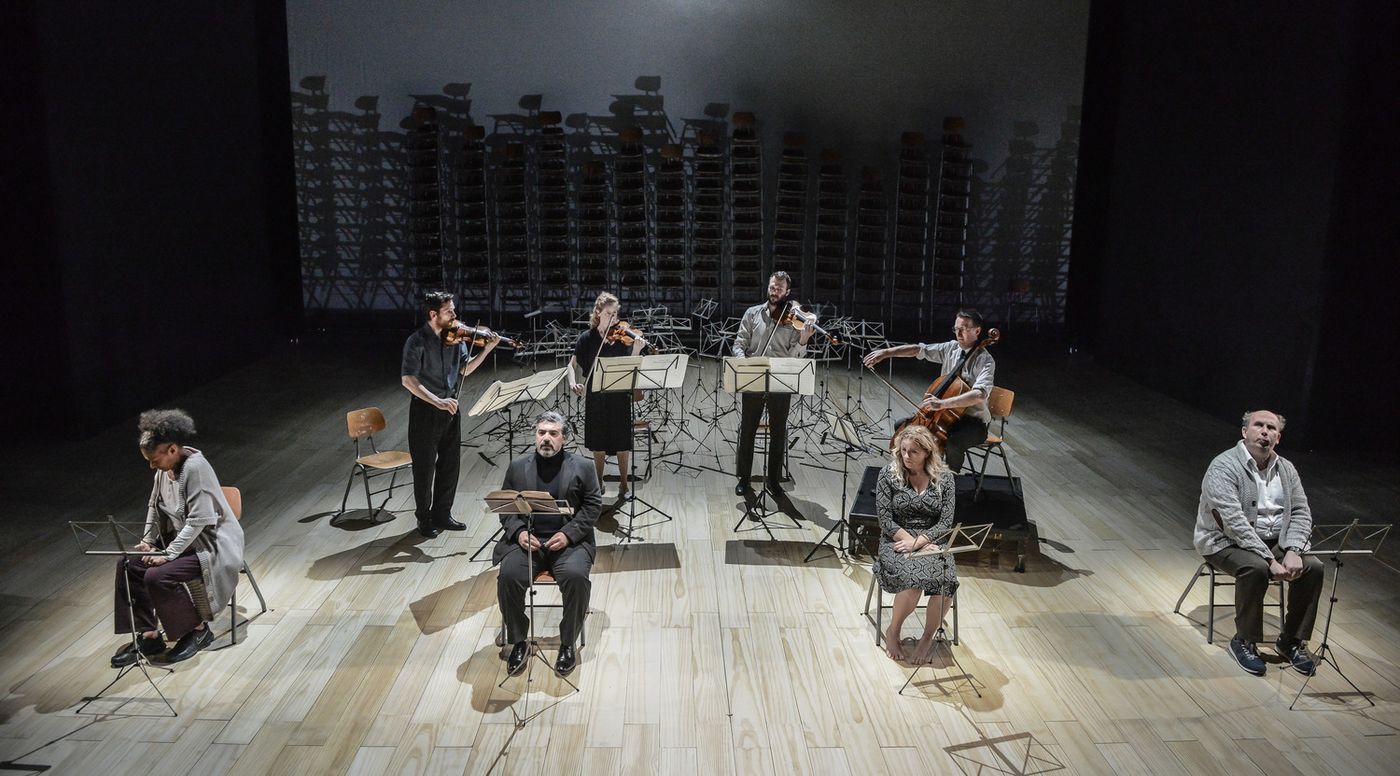Review: THE STRING QUARTET'S GUIDE TO SEX AND ANXIETY, Theatre Royal Brighton

![]() The Mental Health Foundation reports that there were 8.2 million cases of anxiety in the UK in 2013. All of us may feel stressed at some point in our lives, but it can be an unwanted and overwhelming strain on many people's day-to-day activities.
The Mental Health Foundation reports that there were 8.2 million cases of anxiety in the UK in 2013. All of us may feel stressed at some point in our lives, but it can be an unwanted and overwhelming strain on many people's day-to-day activities.
Calixto Bieito's 90-minute devised work The String Quartet's Guide to Sex and Anxiety was commissioned for the Brighton Festival in collaboration with Birmingham Repertory Theatre, Les Théâtres de Luzembourg and Holland Festival. As expected from the title, it explores the themes of sex and anxiety and overlapping links between them.
On entry to the Theatre Royal Brighton, the set (designed by Bieito and Annemarie Bulla) instantly induces some unease with sky-high piles of school chairs and an untidy maze of music stands. The sides of the stage are adorned with two dark grey walls and the back is covered in a plain white sheet. The cast are dressed in shades of grey (costume designs by Bulla), reflective of the bleakness of living with a mental illness.
A lone figure (Miltos Yerolemou) emerges and the audience falls silent. Yerolemou begins a monologue which features excerpts from various works, such as Robert Burton's The Anatomy of Melancholy, The Concept of Anxiety by Søren Kierkegaard, and various poems on similar subject matter. Yerolemou speaks with gravitas, addressing individuals as he holds forth on this aspect of the emotional experience.
Very gradually, three other actors (Mairead MxKinley, Cathy Tyson and Nick Harris) walk on and seat themselves downstage alongside Yerolemou. A string quartet (The Heath Quartet: Oliver Heath, Sara Wolstenholme, Gary Pomeroy and Christopher Murray) also appear and subtly prepare their instruments and music for performance.
The Heath Quartet begin one of two quartet pieces featured in the work - György Ligeti's String Quartet No.2. This 20th-century piece is very dramatic in nature, creating suspense in both the frantic passages of virtuosity and the still sustained chords, often suddenly switching between the two.
Dispersed between the movements, and over the music at times, the four actors individually display the physical and audible aspects of anxiety. You can hear a pin drop during Tyson's account of a child's involvement in a hit and run.
Harris provides some comic relief with witty reflections on how anxiety has tainted his character's life stemming from childhood. He brings some warmth to what is overall a very cold and sinister piece.
Tim Mitchell's lighting design bathes much of the show in white light. This results in appropriate menacing shadows of the actors and musicians on the back screen, adding to the fearful atmosphere.
The "sex" element of the title comes into play in some of the dialogue as the characters reflect on how their anxiety feeds into their thinking about human intimacy. Tyson can't stand human touch; McKinley is concerned about whether her husband is satisfied with her technique, delivered with brutal honesty.
Harris shares how the (many) anti-anxiety medications and therapies he has tried affect his sex life. Yerolemou remains silent and contemplative through much of the middle section of the piece.
Following Ligeti's work, the quartet move to Beethoven's String Quartet in F minor Op.95. While less dissonant to the ear, it still creates tension with its F minor tonality. The musicians play with ease and every note and nuance can be clearly heard.
Much of this latter section of the single-act performance is unspoken, with only Yerolemou speaking again in a more formal manner after the more personal accounts of his colleagues on stage. He speaks of anxiety being a reminder to humankind that we will always be limited by our bodies, a standout phrase in the monologue.
The piece seems rather jumbled which, while reflective of the chaotic nature of the mind during an anxiety attack, makes things hard to follow at times. It isn't always clear who to focus on, and more often than not the musicians steal the attention from the actors.
That said, the music, dialogue, sudden set changes and movement certainly invokes a feeling of unease in the audience, and demonstrates the spectrum of anxiety experienced by humanity.
The String Quartet's Guide to Sex and Anxiety at Theatre Royal Brighton until 24 May.
Photo credit: Brighton Festival
Reader Reviews
Videos

